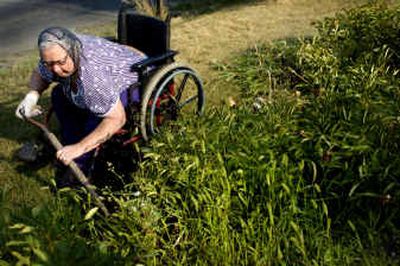Polio couldn’t slow her down

It was a weekday morning, early, after the newspaper arrived, but long before the tiring summer heat. Dorothy Campbell was working a garden spade through one of her flowerbeds when a stranger stopped his car in the street and began shouting at the 75-year-old Veradale woman.
“When I see someone asking for money, I tell them about you,” the stranger said.
Campbell smiled, neighborly, but not boastfully, then reached over the edge of her wheelchair with her spade and continued gardening.
Special? What’s so special about playing the hand you’re dealt in life? Campbell would say her life’s not exceptional, but her story suggests otherwise.
Campbell is a survivor of polio, a nearly forgotten virus that scourged the United States and the rest of world before a vaccine was discovered in 1955. Polio caused tissue in the spinal cord and gray matter in the brain to swell. It paralyzed many of its victims, most of whom were infants and young children.
Adults also caught the virus, but not as often. There are roughly 600,000 polio survivors in America today, the U.S. Centers for Disease Control estimates, and tens of millions worldwide.
Dorothy Campbell was one of those adults. Her journey with polio began less than two years before America’s painful journey ended with a vaccine. There weren’t any warning signs for her. Before the virus struck, Campbell had a mild fever. That was it.
“I was up. I walked into the kitchen to start a fire in the stove and get it going and I heard her in the bedroom say ‘Steve, I can’t get up,’ ” said Steve Campbell, Dorothy’s husband.
Steve Campbell remembers walking to the edge of the bed and gently working the hinges of his wife’s legs. They did that for a while, hoping for a miraculous response, but realized the damage was done.
She wasn’t even 25 years old. And the Campbells had three young children to look after, or at least Steve did. Dorothy Campbell was taken to St. Luke’s Hospital and quarantined for six weeks. The entire hospital stay lasted several months. She lay in a semi-comatose state for days.
At one point, the Campbells’ family doctor, not realizing Dorothy was conscious enough to hear him, stood within earshot of Campbell’s bed and gave a grim prognosis.
“I wouldn’t give 2 cents for her life,” the doctor said.
Aware of what the physician said, Campbell decided she’d better get busy living.
“They had monkey bars and I started exercising as soon as I could reach those bars,” Dorothy Campbell said. “They made us learn to swim. Then at the end of October, I told them ‘I’m going to be home for Thanksgiving.’ “
Doctors were skeptical of Campbell’s announced departure, but she made it home in a wheelchair, where she stayed. The polio affected her from the neck down; she had to fight to regain control of her arms and hands.
“It took me forever to learn how to peel a potato again,” she said.
The Campbells had five more children. What they ate mostly came from a massive vegetable garden Dorothy tended. They raised rabbits and chickens. The man Dorothy had met at a Liberty Lake dance paid the bills and the monthly mortgage for their home at Conklin Avenue and Valleyway with a job as a mechanic. Steve Campbell, now 78, worked for a few outfits, then opened his own shop.
The husband now battles health problems, too. He has asthma and emphysema and fortifies his air with bottled oxygen. Steve Campbell is proud of his wife’s ability to get along, that the couple’s children were never lacking for anything growing up.
Their kids weren’t aware their lives were any different because of their mom’s paralysis, Steve Campbell said. Veradale was a community of truck farms at the time. Whenever schoolteachers talked of how much canning they’d done, the Campbell kids were quick to point out that their mother had done more.
“Well, my mother canned 100 quarts,” the kids would say. When baking was mentioned, the Campbell kids responded, “Well my mother baked 20 loaves of bread.”
When the teachers finally realized Campbell couldn’t stand, they were amazed.
“You never told me your mother is handicapped,” one teacher said to Dorothy’s youngest son, Tim.
The boy went home to consult his mother. He wasn’t sure what the word meant. To Dorothy Campbell, it meant nothing.